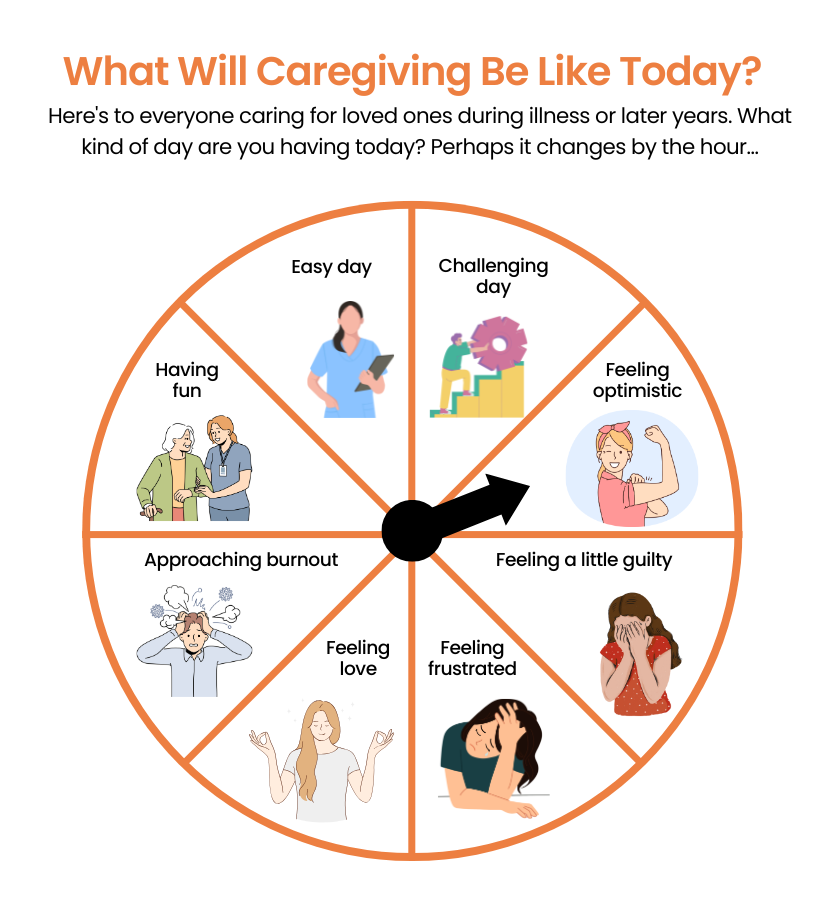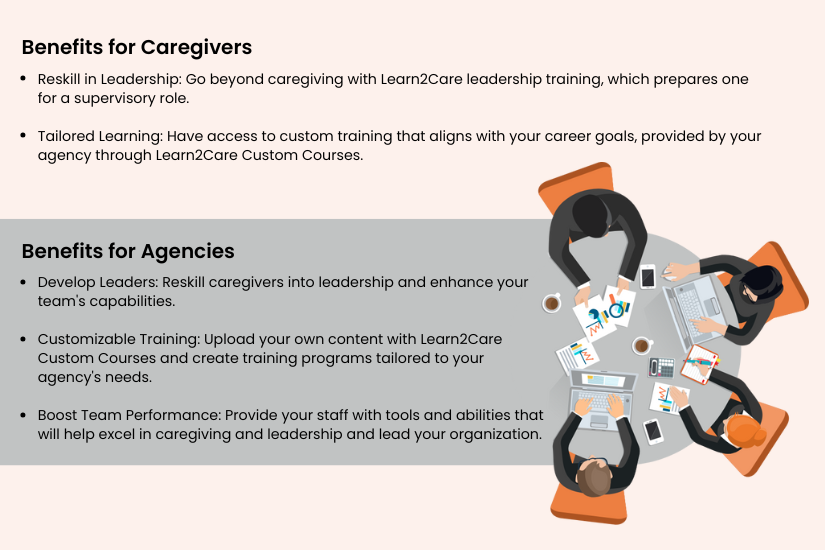
Transitioning into caregiving, whether gradually or suddenly, brings up many emotions. It’s important to know that your feelings are valid. Throughout your caregiving journey, you might experience a mix of good and not-so-good emotions. It’s normal to feel this way, and it’s okay to talk about it.

Taking care of someone every day can be tough. At first, you might think you won’t feel any negative emotions because you love the person you care for. But over time, those feelings can come up. Many caregivers don’t like to admit they feel down because they worry about being judged or burdening others.
Ignoring your feelings can make things worse. It can lead to problems like trouble sleeping, getting sick more often, or using unhealthy ways to cope, like eating too much or drinking too much. It’s important to recognize your feelings and find healthy ways to deal with those emotions.
This article will help you understand some common feelings caregivers have and a few tips on handling them.
Caregiving is a gratifying career, but one that has its own physical and emotional demands. One of the more intangible but profound aspects of caregiving is how caregiving will drain your body with stress. Knowing the physiological impact of caregiving stress can help you know when your body is being drained and help you to take proactive measures to reverse the ill effects.
Chronic stress may have long-term consequences on the physical health of a caregiver. Chronic caregiving stress-related health concerns include:
Ambivalence is when you feel both drawn to and repelled by the task at hand. On tough days, you might wish you weren’t in this situation, longing for it to be over soon. Yet, caregiving can also bring joy and fulfillment, benefiting both you and the person you’re caring for.
Coping – Allow yourself to acknowledge and accept both sides of your feelings. Remember, everyone experiences these emotions at times, and they won’t last forever.
Anger and frustration often accompany caregiving, especially when the person you’re caring for doesn’t accept help or has dementia-related challenges. It’s natural not to have complete control over your emotions; anger can sometimes flare up unexpectedly.
Coping – Be kind to yourself and seek constructive ways to express your feelings. Learn when to step away and give yourself a break. Connect with supportive individuals who can lend a listening ear when you need to vent.
Feeling overwhelmed and out of control can lead to anxiety, manifesting as a short temper, the desire to escape, trouble sleeping, or physical symptoms like heart palpitations or crying spells.
Coping – Listen to your body’s signals and take action when anxiety arises. Pause, breathe deeply, and focus on calming activities like prayer, meditation, or tea. These moments of respite can provide relief from the stress of the moment.
Feeling bored is quite common when you spend much time at home caring for someone else. You might find yourself longing for activities that fulfill your own desires and needs. By the end of the day, exhaustion might set in, making it difficult to pursue anything that interests you.
Coping – Taking breaks from caregiving can provide much-needed relief. Allocating some time for yourself boosts your patience and resilience and allows you to engage in activities that bring you joy, such as socializing, going for walks, or indulging in a good book. Enrolling in caregiver training programs can also introduce you to new hobbies or interests related to caregiving, making your routine more engaging. Additionally, comprehensive caregiver training for caregivers can offer flexible learning opportunities, allowing you to pursue personal development at your own pace, ultimately adding variety and fulfillment to your daily life.
Fatigue and stress can lead to crankiness and irritability, making maintaining control over your emotions challenging. Your feelings might fluctuate rapidly; even minor annoyances can trigger outbursts due to depleted reserves.
Coping – Recognizing the signs of crankiness and irritability is crucial. If you notice these feelings creeping in, it’s likely time for a break. Rest is essential, as exhaustion diminishes our ability to regulate emotions. Instead of resorting to alcohol or unhealthy snacks, consider journaling or confiding in a trusted friend or professional to release pent-up frustrations.
Caregivers are susceptible to depression, which can manifest as feelings of hopelessness, helplessness, sleep disturbances, or persistent sadness.
Coping – Depression warrants serious attention and treatment. Consult with your physician if you suspect you’re experiencing depression symptoms. Joining a caregiver support group, seeking guidance from a counselor well-versed in caregiving issues, and soliciting assistance from loved ones are beneficial steps. Additionally, regular exercise has been shown to alleviate some symptoms of depression.
Caring for someone’s needs, like helping them use the toilet or cleaning them up, can feel too private for many caregivers. Changing adult diapers or dealing with bodily fluids like stool and urine can be nauseating and repulsive. Similarly, having to assist with intimate tasks for a parent or loved one can be uncomfortable and unsettling. Additionally, witnessing sloppy eating habits, neglect of personal hygiene, or cleaning up vomit can trigger feelings of disgust.
Coping – Accepting our feelings of revulsion towards these tasks can be challenging, especially since the care receiver isn’t in control of these behaviors. Sometimes, we may even wrongly believe they’re doing it intentionally to upset us. Finding ways to reduce the need for personal care tasks, such as hiring an attendant or involving family members who may cope better, is crucial for navigating the caregiving journey. Additionally, learning techniques to simplify tasks, like using spill-resistant utensils during meals, can make caregiving more manageable and less distressing.
Managing embarrassing situations in public settings, such as impolite comments or urgent restroom needs, can be stressful for caregivers. Additionally, dealing with a care receiver’s refusal to bathe, resulting in body odor, can lead to feelings of shame and embarrassment.
Coping – Some caregivers find it helpful to carry cards explaining their loved one’s condition, like dementia, to offer explanations to others during challenging situations. Others may limit outings to avoid embarrassment altogether. Seeking support from friends, family, or attendants when going out can provide assistance and comfort when facing embarrassing situations.
The responsibility of caregiving can evoke fears about potential emergencies, Coping abilities, and feelings of guilt for things that may go wrong. These worries about hypothetical situations can be overwhelming and hinder our ability to enjoy the present.
Coping – Having contingency plans and backup caregivers in place can alleviate fears of emergencies. Talking to someone who understands your situation can provide perspective and ease fears. Identifying what aspects of caregiving you can control and preparing accordingly can help manage anxieties about the unknown. In fact, many caregivers also fear their work because of a lack of skill. To thrive with confidence, we recommend you receive professional training for caregivers.
Frustration often arises from feeling inadequate or when things don’t go as planned despite our best efforts. This frustration can lead to unhealthy Coping mechanisms like stress eating, substance abuse, or losing one’s temper.
Coping – Recognizing and acknowledging the frustration associated with caregiving is essential. Joining a support group can provide valuable insights and strategies for Coping. Taking regular breaks from caregiving, prioritizing self-care activities like exercise and adequate sleep, and seeking professional help when needed can alleviate feelings of frustration.
Witnessing the decline of a care receiver and the loss of their abilities can be heartbreaking. Caregivers may mourn the loss of the person they once knew and their relationship with them, leading to ongoing grief.
Coping – Creating rituals or practices to honour and release feelings of grief can be therapeutic. Seeking support from others who understand and allowing oneself to feel and process grief are essential for healing.
Feelings of guilt can arise from various aspects of caregiving, such as not preventing illness, feeling impatient, or desiring relief from caregiving responsibilities. Caregivers may also feel guilty for not being able to do enough or for having negative feelings towards their care receiver.
Coping – Granting oneself permission to forgive and accept imperfection is crucial. Recognizing that it’s impossible to be perfect all the time and reframing guilt into regret can help alleviate feelings of guilt. Seeking support from support groups, friends, or professionals can offer validation and reassurance. Engaging in online training for caregivers can provide strategies to manage these feelings more effectively.
Impatience often arises from the challenges of caregiving, such as managing daily tasks while juggling multiple responsibilities. Caregivers may feel frustrated when care receivers resist assistance or move slowly.
Coping – Forgiving oneself for feeling impatient and acknowledging the difficulties of caregiving is essential. Taking a slower approach, allowing ample time to complete tasks, and understanding what aspects of caregiving are within one’s control can help manage impatience.
Caregivers may experience jealousy towards friends or family members who seem to have more freedom or fewer caregiving responsibilities. Comparing one’s situation to others can lead to feelings of resentment and envy.
Coping – Admitting feelings of jealousy is the first step towards managing them. Focusing on gratitude for what one does have and finding support from others can help shift focus away from envy. Many caregiver training programs often cover emotional well-being, helping caregivers reframe their perspectives and find satisfaction in their roles.
Feeling unappreciated by care receivers can be hurtful and demoralizing. Caregivers may find it challenging to accept help or recognition from others, leading to feelings of loneliness and isolation.
Coping – Recognizing and acknowledging one’s own efforts through journaling or seeking validation from support groups can help counteract feelings of underappreciation. Building a network of supportive individuals who recognize and value caregivers’ contributions is essential for maintaining morale.
Long-term caregiving can lead to feelings of isolation and loneliness as caregivers’ social circles may shrink, and communication with friends becomes less frequent.
Coping – Seeking opportunities to engage in activities outside of caregiving, such as joining support groups or accessing respite programs, can provide much-needed social interaction and support. Identifying and reaching out to individuals in one’s wider support network, including neighbors, friends, and community organizations, can help combat loneliness.
Caregivers experience numerous losses, including loss of control, independence, financial stability, and personal identity. These losses can lead to feelings of grief and depression.
Coping – Acknowledging and processing the losses associated with caregiving is essential for healing. Identifying specific losses and seeking support from others who understand can aid in Coping with grief and depression.
Feeling resentful towards family members who aren’t providing adequate support or towards the caregiving situation itself is common among caregivers. This resentment can stem from feeling overwhelmed, unappreciated, or unfairly burdened.
Coping – Addressing family dynamics and tensions can be challenging but seeking support from family meetings or discussions can help distribute caregiving responsibilities more evenly. Additionally, expanding the support network to include reliable individuals who are willing to help can alleviate feelings of resentment.
Caregivers often experience sleep disturbances and chronic fatigue due to the demands of caregiving responsibilities. Lack of adequate rest can lead to various physical and emotional health issues.
Coping – Prioritizing sleep and seeking assistance from healthcare professionals or respite programs to address sleep disturbances is crucial for caregiver well-being. Incorporating self-care practices, such as regular exercise and relaxation techniques, can help manage fatigue and prevent burnout. Enrolling in professional caregiver training can offer techniques for self-care and methods to seek appreciation constructively.
– Dr. Eboni Green, Co-Founder, Caregiver Support Services
Being a caregiver can be tough, with many different feelings popping up along the way. It’s okay to feel overwhelmed, frustrated, or even guilty sometimes. But it’s also important to remember that you’re doing something important and meaningful by caring for someone you love.
Just know that you’re not alone in this. People and resources are out there to help you when things get tough. Taking care of yourself is just as important as caring for the person you’re looking after. So, don’t forget to ask for help when you need it and take time for yourself whenever you can.
You’re doing a great job, and your efforts as a caregiver make a big difference in someone’s life. Keep going!
If you’re serious about taking your caregiving team to the next level and ensuring they’re maintaining those professional boundaries, then you need to check out Learn2Care. With Learn2Care, you get access to top-notch training that’s tailored to their needs.
Here’s what we bring to the table:

So, what are you waiting for? Upskill your team, Learn2Care, and watch your caregivers become certified caregiving professionals.
Contact us to inquire about our state-wise training courses and take the first step towards upskilling your team with a 14-day free trial!